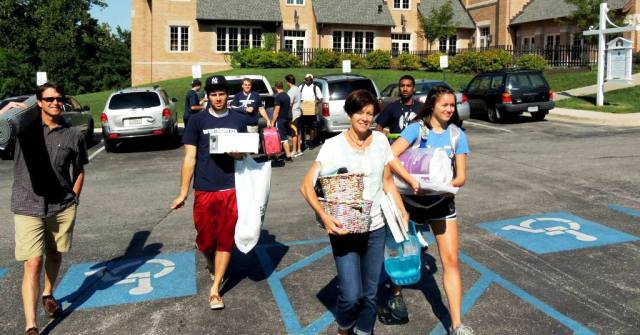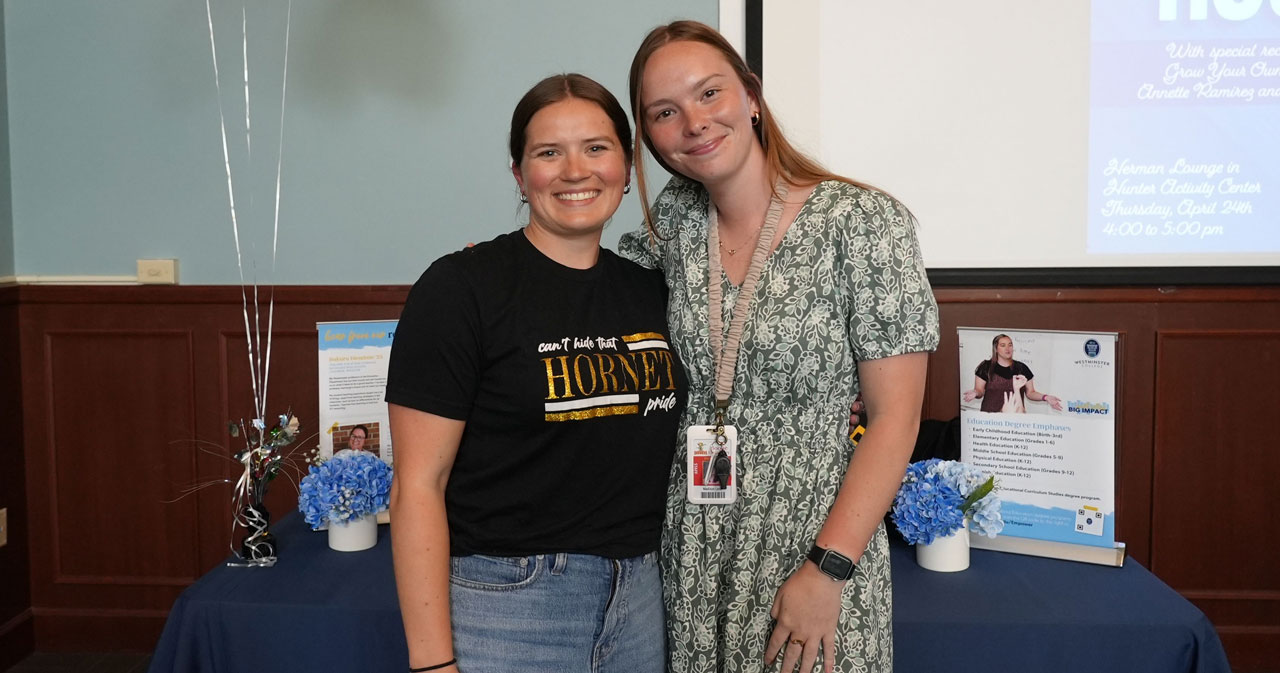Sending a son or daughter to college is a roller coaster ride for both parent and student. The excitement of choosing college classes, picking out a comforter and other residence hall life essentials, shopping for a laptop, and other summer tasks all lead up to move-in day and saying good-bye.
“If nothing else (move-in day) was a reality check for me that this is where he is living and his bedroom at home would be empty,” said Karen Williams, who sent her 18-year-old son Jack to Westminster College for the first time last fall. “It was important for me to make his bed in his dorm room before I left—I guess like a momma bird making a safe, comfortable nest before we left for home.”
The excitement about the new opportunities, experiences, and independence are mixed with the anxiety of the unknown that lies ahead and the sadness of leaving the known behind.
Eleni Pardalos of Columbia, whose son Arris was a freshman, believes: “No one can really prepare you for that moment that you have to ‘live’ outside the home you grew up in. It’s a first and it takes time.”
She did, however, consult with other parents about how their children adjusted during the first year of college and when they told her about much they loved college, it made her “feel at ease.”
All the parents agreed participating in Move In Day is important. Annamarie Cooper of Jefferson City says, “It enables the family and student to get involved and aware of whatever needs the student will have. It gives peace of mind for the family to know the situation and location of their student’s ‘new home.’”
Cyndi Rackers, also from Jefferson City, confirms: “It’s just as much of a learning experience for the parents as it is for the students.”
Therefore, with proper preparation, both logistical and emotional, this important transition can take place smoothly. Those who have made this transition successfully are able to offer helpful advice. Below, a number of Central Missouri and other Missouri parents of Westminster College (Fulton, MO) share some helpful hints.
College Move-In Day: What to Bring
As for what to bring, all the parents stressed comfortable pillows and bedding so students can get a good night’s sleep.
Kirt Nichols of Columbia suggested: “personal clothing, personal computer, tablet, pictures, a refrigerator, microwave, coffee pot, and laundry basket.”
Karen Williams sent freshman son Jack with her own homemade “medicine cabinet in a Rubbermaid container filled with Tylenol, cold/sinus/allergy tablets, band aids, cough syrup, eye drops, and ice packs and a heating pad (Jack plays football.),”
Tim and Jackie Branneky say you can’t go wrong with storage containers that can fit under the bed or have stackable drawers. The one item they wish they had sent immediately was some way to lock up a wallet and valuables. One of their son’s favorite current security items is a fake book found online with a small container cut out in the middle of the pages to store his wallet and cash. The book appears to be a regular book that can be put among the others on the shelf.
Other essentials parents mentioned were toiletries, snacks, entertainment items, laundry and vending machine change, a fan, a phone charger, extension cords, power strips, and three-prong adapters.
Once the car is unpacked and the bed made, it’s time to give students some space, according to several parents. Leave for a while so students can set up the room the way they want it and have some time to begin to bond with roommates and other students. According to Neil DeVasto of St. Louis, “Dad and Mom are there as comfort for acclimating to the new environs but as the student bonds with roommates and other students as the day wears on, a certain comfort level seems to be reached by the time the parents head home.”
Helping your child adjust to college life
Nervousness over what a roommate will be like is common for new college students.
Cyndi Rackers, whose son Kole was a freshman, counsels, “It takes time to get to know someone. Make the effort and speak up about things before they become issues.”
Neil DeVasto says it is a good idea for parents to encourage students to not room with someone they know from high school or their hometown.
“That can retard the student getting acclimated to new relationships with classmates and teammates,” he says. He advises requesting someone with a shared interest such as another soccer player or fellow musician, for example, who will share a lot of common experiences.
Annamarie Cooper stresses mutual respect and responsibility as key to a living with a new roommate.
In addition to adjusting to a new shared living situation, students often have to learn financial independence for the first time.
To handle the spending money situation, Jim Young from Lee’s Summit, sees to it that his son Andrew, who is a freshman, has $30 a week deposited into a bank account with a debit card set up in his name. “If he needs more, he has to ask his Dad (not his Mom),” he says.
Letting go but staying in touch
To stay in touch, most parents thought social media was the way to go because it is short and sweet, can happen at any time, and even photos of events at home can be sent. Tom Husak of Ballwin, whose son Trent was a senior, says: “A student can text you while hanging with their friends, eating, or watching TV but they may not be able to call. Do things together while away so you can maintain a relationship. For my son, it was Fantasy Football and the NCAA Basketball Tournament. Send videos of their pets doing dumb things.”
Cyndi Rackers says texting works well for them with a phone call over the weekend.
All parents sending children to college recognize it is difficult to let go, but they must if young people are to move to the next level of maturity, responsibility and self-discipline. College students must have this time of freedom to explore with the safety net of parental guidance there if needed.
One of the way parents can help make the college adjustment a happy one is to encourage their student to get involved in the campus culture…attend events and join organizations.
As Tom Husak advised his son: “Enjoy the experience but don’t expect everything to be perfect. Know there will be bumps in the road…academically, athletically, socially. Don’t be afraid to step away from something that makes you uncomfortable. Listen to that little voice when it tells you something is wrong.”
If things aren’t going well in the college experience, parents who are knowledgeable about the resources available at the college can help guide their students to the proper person, whether that is a health service, career center, advisor, dean, counselor, or tutor. Or sometimes it may just be necessary to provide a sympathetic ear.
Parents should take comfort that at least some of the advice and learning experiences they have shared with their sons and daughters will stick in this next stage of their lives.
Dr. Kasi Lacey, Executive Director of the Wellness Center at Westminster College, stresses the importance of assuring students their parents believe in them at this stage of their lives and of giving them the freedom to make their own mistakes and learn from them. Her experience has been that once students start going to class, making friends, and becoming involved in activities on campus, they adjust well and feel connected.
“Most of all, parents should listen to their students to see if they are dealing with normal adjustments to college and asking them how they can be supportive,” says Dr. Lacey.
This is the editorial account for Westminster College news team. Please feel free to get in touch if you have any questions or comments.






